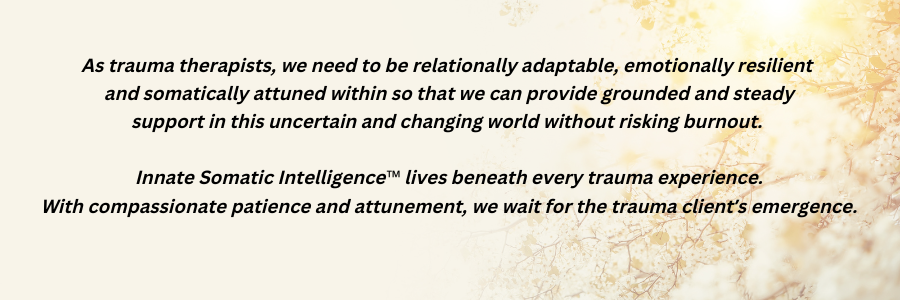Innate Somatic Intelligence™ Trauma Therapy Approach (ISITTA)
No events to show
Description
Innate Somatic Intelligence™ Trauma Therapy is an integrative, relational approach to healing trauma. Based on essential Hakomi Therapy techniques, ISITTA integrates a polyvagal trauma-informed view on the somatic, relational, and clinical skills needed to transform trauma experiences.
This highly experiential training is designed for therapists/practitioners who want to learn from their own somatic experience and be part of a mindful learning community, guided by trauma-informed principles. We begin with the innate wisdom of the trauma practitioner’s own nervous system by using trauma-informed movement practices* to develop and increase an attuned and resourced connection to oneself and one’s body. We then continue to layer techniques into these practices that are designed to facilitate clients emotional and somatic releases. These practices are also key to studying the limiting trauma beliefs that hold back the client’s growth.
ISITTA training is based on the core assumption that trauma healing is not a problem to be solved, but rather a psychobiological process to be connected too. Trauma healing can reconnect us with innate somatic intelligence that is available in all of us: the “river beneath” the trauma. This river is our innate healing capacity we access through the safety of the attuned therapeutic relationship where we use precise somatic and clinical practices.
We train the trauma therapist with in-depth somatic tools such as self-regulating practices, felt-sense awareness (somatic attunement), safe touch and movement therapy techniques to help heal both individual and collective trauma experiences.
The training has four main goals:
-
Somatic Knowledge: Increase this embodied wisdom ™ skill set for therapists who want to incorporate in-depth somatic therapy tools into their existing therapy practice. We will integrate movement therapy, breathing techniques and trauma-informed mindfulness tools.
-
Clinical Knowledge: Apply trauma-informed and evidence-based clinical therapeutic interventions tailored to developmental and relational traumas. We will use a combination of demonstrations, didactic presentations, and supervised practice groups.
-
Wisdom & Self-Care: Demonstrate how to cultivate the self-compassion and resilience the trauma therapist needs by practicing and applying regulating techniques to support the therapist through challenging client experiences and countertransference. Develop body-based self-care tools to support both emotional and nervous system capacity.
-
Community Support: Create a supportive experiential learning setting and build a network of somatic therapists/practitioners who share the values of being compassionate, relational, somatic and attuned to social justice and systemic experiences.
ISITTA’s focus is to enable the trauma practitioner to alleviate suffering in complex therapy environments, while acknowledging that individual trauma is interconnected with collective, intergenerational and historical trauma. 
How is ISITTA unique in Trauma Healing?
Transforming your clients’ traumatic experiences isn’t just about savvy therapy skills and clinical interventions. It requires a refined ability to see deeply into your client’s suffering and trust their Innate Somatic Intelligence™. This means that the therapist/practitioner is working on themselves as they deepen their somatic therapy skills. Trauma therapists sit at the intersection of individual and collective trauma support and must also understand trauma as an issue of social justice and socio-political forces. This requires developing skills that include seeing the complexity of the client's process in the present moment and also as it unfolds in their current and historical living and societal contexts.
Facilitating the process of unearthing one's Innate Somatic Intelligence™ is an in-depth journey into how the past has impacted the present, both mentally, emotionally, systemically and relationally.
ISITTA is about learning to trust the client’s wisdom by offering concrete, present-moment experiences and safe explorations that can shift the inner perception of the historical trauma imprints. These therapeutic skills require a different kind of training. The therapist has to be willing to partner, as well as guide, the client while listening to what truly wants to emerge. This is not an easy process. The pressure of performing well, delivering change, being overwhelmed with the suffering and pain, the helplessness and one's own triggers all come into play when engaging in in-depth trauma healing.
In this method we are learning to stay connected with the present moment unfolding of the body's healing experience. We trust the body’s capacity fo heal. Through mindful movements we reconnect with the innate capacity of wanting to move out of an immobility response by sensing into the fluidity in our bodies. Every trauma experience has both a memory sequence and also a movement sequence we can access to release limiting psychobiological patterns in a safe and supported way. What is unique to ISITTA is that we utilize the fluid systems of the body to support this organic healing process.
What are the six principles in trauma work?
ISITTA is based on six principles originally inspired by the five classic principles of the Hakomi Method. These Principles frame the work and guide the practitioner towards integrity, self-awareness and embodied wisdom™. The principles act as an inner compass in which to anchor the somatic and trauma techniques used. For example, an intervention that is offered from a compassionate inquiry mindset has a particular quality/felt sense/ impact on the client. And, if the therapist holds relational and community healing as a value, we will understand our own biases within the context of our work as trauma therapists.
Here is a brief overview of the six guiding principles.
ISITTA Principles
-
Innate Somatic Intelligence™
The body is intelligent, this healing wisdom is innate and, with safety, can be accessed. The wisdom body knows how to heal. -
Relational & Community Healing
We are co-regulating humans. Healing happens in our relationships with each other in a safe and inclusive community, and in relation to our natural environment. When we safely co-regulate, we can grow. -
Adaptability & Embodied Wisdom™
Everything changes, nothing is permanent. We can grow, adapt and thrive. We are a fluid organism. With adaptability, we are able to meet the challenges in this increasingly complex world. Through this process we develop embodied wisdom™, an inner guidance that can meet the challenges we face with both knowledge and right action. -
Compassionate inquiry
The compassionate self-inquiry process is evoked/arises/happens when we extend kindness to ourselves and others. We learn to trust the process even in times of suffering. Others become motivated and/thrive in the presence of compassionate regard. The therapist is in a compassionate inquiry with the client, that supports the unfolding process of the client. -
Embodied Consciousness
Engaging and embodying mindfulness allows us to shift our awareness and purpose towards new insights and experiences. This intentional practice and mindset helps us discover our Innate Somatic Intelligence™. -
Interconnection & Interdependence
Understanding our own healing in the context of family, community, and society allows us to be of service to others. By understanding our interconnectedness, we integrate our actions of past and present and become intentional in our actions for the future. We recognize the interdependence of all living beings and actions and become deliberate in our choices.
The Classic Principles of the Hakomi Method
We acknowledge these inspiring principles as the foundation of mindful and wakeful living and practice.
-
Mindfulness
-
Body-mind holism
-
Non-violence
-
Organicity
-
Unity
Meeting complex trauma challenges at this time
Contemporary helping professionals face the complexities of trauma healing at this time. Wedged between the individual trauma story within the cultural and socio-political influences that can create a multiplicity of traumas, the trauma therapist/practitioner has the responsibility of creating a safe healing environment. We are living at a time where we are called upon to integrate therapy modalities that best serve our clients’ needs, as well as to understand the impact of social and historical trauma on our bodies.
The trauma therapist needs to meet this complexity by training differently–it’s no longer enough to just learn interventions and skills. We need to become a different kind of practitioner, one who’s unafraid to sit with suffering in a deep and compassionate way. We need to become trauma change catalysts who can see beyond the stigma of trauma and support growth in our clients and facilitate the sacredness of their life journeys.
We can’t fix past traumas for our clients, but we can learn how to respond to their longing for wholeness with wisdom, skill and heart. We can support their nervous systems to regulate, teach them somatic and mindful tools, and help them trust that their trauma story has deep purpose. We can learn how to ground ourselves in kind heartedness and work with our clients’ traumatic experiences as our own triggering arises. This new way transcends the old paradigm of healing and delivers precise and effective tools for self-healing and transformation.
The ISITTA training provides a clear pathway to becoming this kind of healer.
Learning from the Soma up
Guiding clients through trauma processes also requires a fluid and resilient nervous system. The adaptive practitioner commits to healing their own nervous system and uses their nervous system’s resilience to support clients towards health and new ways of being. In this training, you’ll focus on learning “from the soma up” to deepen both your cognitive and somatic understanding. In other words, you won’t just learn techniques and practices for healing trauma–you’ll learn to embody them.
Being a somatically intelligent practitioner means understanding the current socio political and societal challenges that we’re collectively facing. We need to understand not just our client’s personal trauma, but how it intersects with intergenerational and collective trauma in a society that’s constantly changing and evolving. We explore who we need to become to facilitate health and wellbeing in this climate of dramatic change. These current challenges require a new mindset to help heal the deep fractures in communities, societies and in the relational realms.
What You Will Learn
Learning Outcomes
-
Cultivate somatic knowledge from the inside out and grounded in trauma- informed theory and practice.
-
Develop a clinical interventions toolkit that serves complex trauma clients by understanding that trauma is interconnected with societal history, collective trauma and current systemic influences.
-
Apply wisdom teachings to one's own therapy life and practice.
-
Practice and apply somatic and clinical knowledge during the training through peer and supervised practice groups toward becoming a highly skilled somatic trauma practitioner.
-
Build a network of somatic therapists/practitioners that work in a somatic, trauma-informed and compassionate relational model.
Core Trauma Skills Training
In ISITTA training, you will learn how to work with a variety of different traumas, including relational and developmental trauma, physical trauma, and collective and systemic trauma.
You’ll come away from this training with an evidence-based clinical skill set and trauma-informed somatic techniques for self and co-regulation.
ISITTA is an in-depth somatic training, integrating somatic trauma techniques, movement therapy tools, expressive arts, polyvagal sensitive regulating practices, embodied and mindfulness-based exercises, didactic learning and live demonstrations as well as real-time practices with colleagues.
The training will demonstrate how to
-
Facilitate safe somatic trauma processes.
-
Suggest trauma tools, and train clients to use them, that apply to their unique needs.
-
Cultivate our own therapist seat through somatic and movement techniques to regulate our triggers and countertransference experiences.
-
Move a stuck trauma process and the shame and guilt that come with the process through concrete exercises.
-
Access deep somatic emotional reservoirs within the clients’ nervous system and psyche.
-
Apply a variety of somatic interventions.
-
Work with cultural, historical and collective trauma influences and biases.
To honor and support the diversity of learning styles, we use a variety of learning activities, including experiential guided group practice, somatic practices, movement, small practice groups, short lectures and discussions.
Because of the somatic and experiential nature of this training, participants will need to be comfortable learning through movement, breath, safe, boundaried touch and mindful interpersonal exploration.
Topics Covered:
Module 1
-
Therapist seat and self-regulation
-
Waking our Innate Somatic Intelligence
-
ISITTA principles
-
Somatic Attunement in trauma therapy
-
Somatic Resourcing techniques
-
Hakomi Contacting skills
-
Social Locations awareness - The Systems that Shape Us
-
Polyvagal informed theory and trauma informed views on somatic healing
Module 2
-
Trauma motifs in the body
-
Somatic inquiry process
-
Relational trauma, CPTSD
-
Types of trauma, from individual to collective trauma
-
Compassionate co-regulation
-
Hakomi Tracking and safe Accessing skills
Module 3
-
Embodied wisdom™ practices
-
Social justice and trauma
-
Trauma processing skills
-
Learn to read trauma indicators in the body
-
Movement therapy tools for trauma healing
Module 4
-
Trauma and dissociation
-
Making new meaning from trauma narratives
-
Facilitating the embodied process
-
Movement interventions for trauma
-
Expressive arts trauma techniques
-
Safe relational touch explorations for trauma clients
Module 5
-
Internal trauma beliefs & protective parts
-
Skillfully meeting resistance and discomfort
-
Developing safe explorations for Missing Experiences
-
Post traumatic growth
-
Transformational moments in trauma therapy
Module 6
-
Identifying trauma parts
-
Understanding body dissociation
-
Trauma and shame
-
Integrating trauma processes
-
Endings and separations related to trauma styles
-
Special consideration working with psychedelic associated therapy and somatics
Module 7
-
Completion process and barriers
-
Integrating rituals of meaning
-
Developing sustainable somatic protocols for clients
-
Self-care for the therapist/practitioner
Who Is This For?
ISITTA training is designed for psychotherapists, psychologists, counselors, healers, social workers, coaches and medical professionals who want to include an in-depth somatic approach to trauma healing. It is designed for professionals who value experiential learning and recognize their own change process as essential to becoming a more effective healer.
This unique training requires a commitment to learning outside of your comfort zone and beyond your intellectual knowledge, as well as a willingness to delve into the mysteries of the body’s healing powers.
The Innate Somatic Intelligence™ Trauma Therapy Approach (ISITTA) is based on the belief that the inside-out transformation of the therapist is essential in supporting the client’s journey towards a whole and self-sustaining life. When we learn about/identify/learn to listen to/connect with and train our own somatic wisdom and knowledge, we can guide our clients safely and precisely into the vast resource and creativity that they hold in their bodies.
Prerequisites
We require an introduction to ISITTA method through an online (3-hour minimum) or in-person workshop be taken prior to taking this training. Exceptions can be made if applicants have trauma training experiences. Please note these on your application for consideration of waving the requirement.
An application is required for this training. The application fee is $75.
APPLY HERE
Meet Your Teacher


Hours and schedule are subject to change.


An application is required for this training. The application fee is $75.
Early Enrollment: $4,500 for applications received by September 10, 2023
Regular Tuition: $4,995 for applications received by September 30, 2023 (final application deadline)
Live In Person Add On $500
This amount is for the in-person portion of this training the weekend of February 26-28, and does not include any travel related expenses.
Maximum attendance for the live, in person weekend is limited to 40 participants and will be first-come, first serve. Should there be less than 10 participants enrolled in the live, in person event, we will cancel and refund the $500.
Within 7 days after you are notified of your acceptance, a $400 non-refundable deposit is due to hold your space in the training. The final tuition balance is due by September 30, 2023 unless a payment plan has been arranged with Embodywise prior to the training start date.
All participants will need to sign a contract agreeing to the financial conditions of this training.
VISA, MasterCard, Discover and American Express accepted.
Cancellation Policy
Participants who withdraw on or before the final application date (September 30, 2023) will receive a full tuition refund less a $400 non-refundable deposit. If in person add on was purchased, the $500 will not be refunded. This fee will only be refunded should Embodywise need to cancel the in-person session.
.png)
This program is sponsored by Innate Somatic Intelligence Institute. Innate Somatic Intelligence Institute is approved by the California Association of Marriage and Family Therapists to sponsor continuing education for LMFTs, LPCCs, LEPs, and/or LCSWs. Innate Somatic Intelligence Institute maintains responsibility for this program/course and its content.
This course meets the qualifications for up to 89.5 total hours of continuing education credit for LMFTs, LPCCs, LEPs, and/or LCSWs as required by the California Board of Behavioral Sciences. CE approval agency: CAMFT. Provider number: 82187. CE hours are subject to change with schedule changes.
You will need to sign our CE sign-in sheet and submit a signed class evaluation form to receive CE credit for this course.
We will email CE certificates within 30 days after the end of each monthly session.
If you live outside of California, please check with your local licensing board to ensure that they’ll accept this course for CE credit.

For more information, including accommodation for special needs and details about our grievance process, contact our administrator at [email protected].
